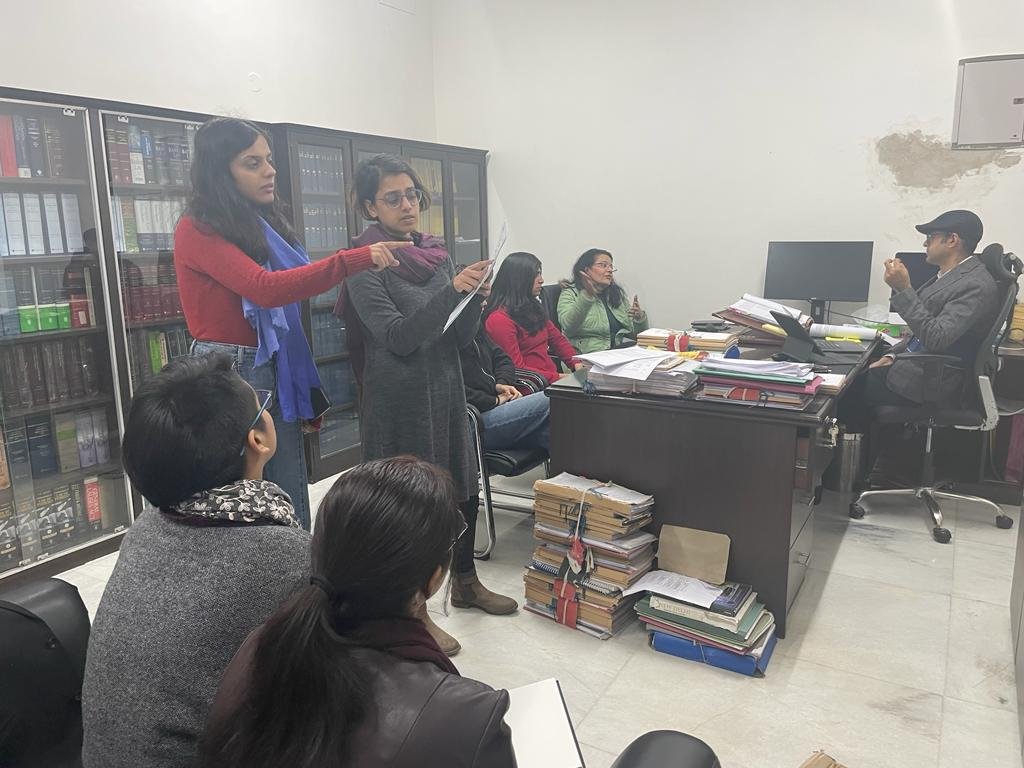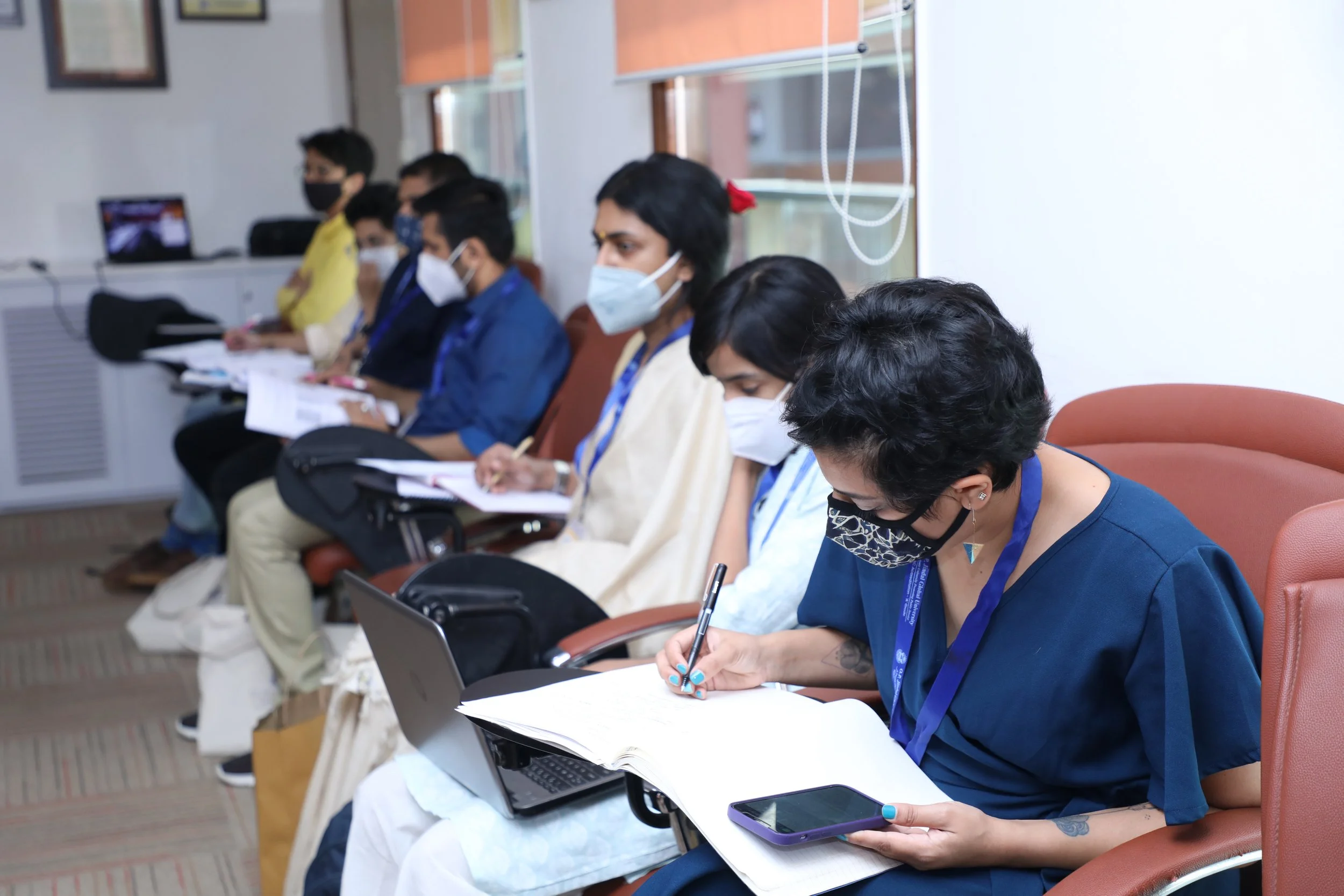
The Law and Marginalisation Clinic
The Law and Marginalisation Clinic is an advocacy-community outreach initiative by CJLS at Jindal Global Law School.
The Clinic furthers our core aim and brings together activists, movements, scholars and community members to tackle issues of systemic harms and challenge power structures to develop intersectional anti-oppression discourses when it comes addressing marginalisation along the axis of gender, caste, indigeneity disability, and sexuality in comprehensive ways through classroom teaching and field projects.
Our clinical interventions are collaborative and multidimensional: not only do we engage students directly, but we also seek to shift the focus away from pure doctrinal questions, shed light on the lived experiences of marginalised persons, and engage with policy, research and advocacy to advance an interdisciplinary and critical approach towards using the law as a tool for social change. Through our multi-pronged interventions, we seek to target, primarily, transgender and gender-variant persons as key beneficiaries by building capacities on ground when it comes to advocating for rights and navigating the various legal and institutional barriers they continue to face, We also see students, activists, and young legal professionals engaging in social justice work as direct beneficiaries of the proposed initiatives through programs that will focus on proliferation of information and critical engagement with the law in order to advance the rights of transgender and gender-variant persons.
We believe that long-term institutional shift can only be brought about by consultative and immersive advocacy that creates spaces for each person or group with lived experiences of marginalisation to voice their concerns.
Our engagement goes beyond our interactions with public officials and state functionaries, such as judges and parliamentarians, and seeks to include persons working at every level, including students, activists, scholars, community members, and civil society organizations to ensure that progressive social change is not taking place in silos.
Through our bottoms-up approach, we facilitate systemic change by foregrounding community-centric and anti-carceral models of justice as well as intersectional anti-oppression discourses that comprehensively address the structural hierarchies that have aided in the historical marginalisation of individuals and groups along the axes of gender, caste, indigeneity, disability, and sexuality.
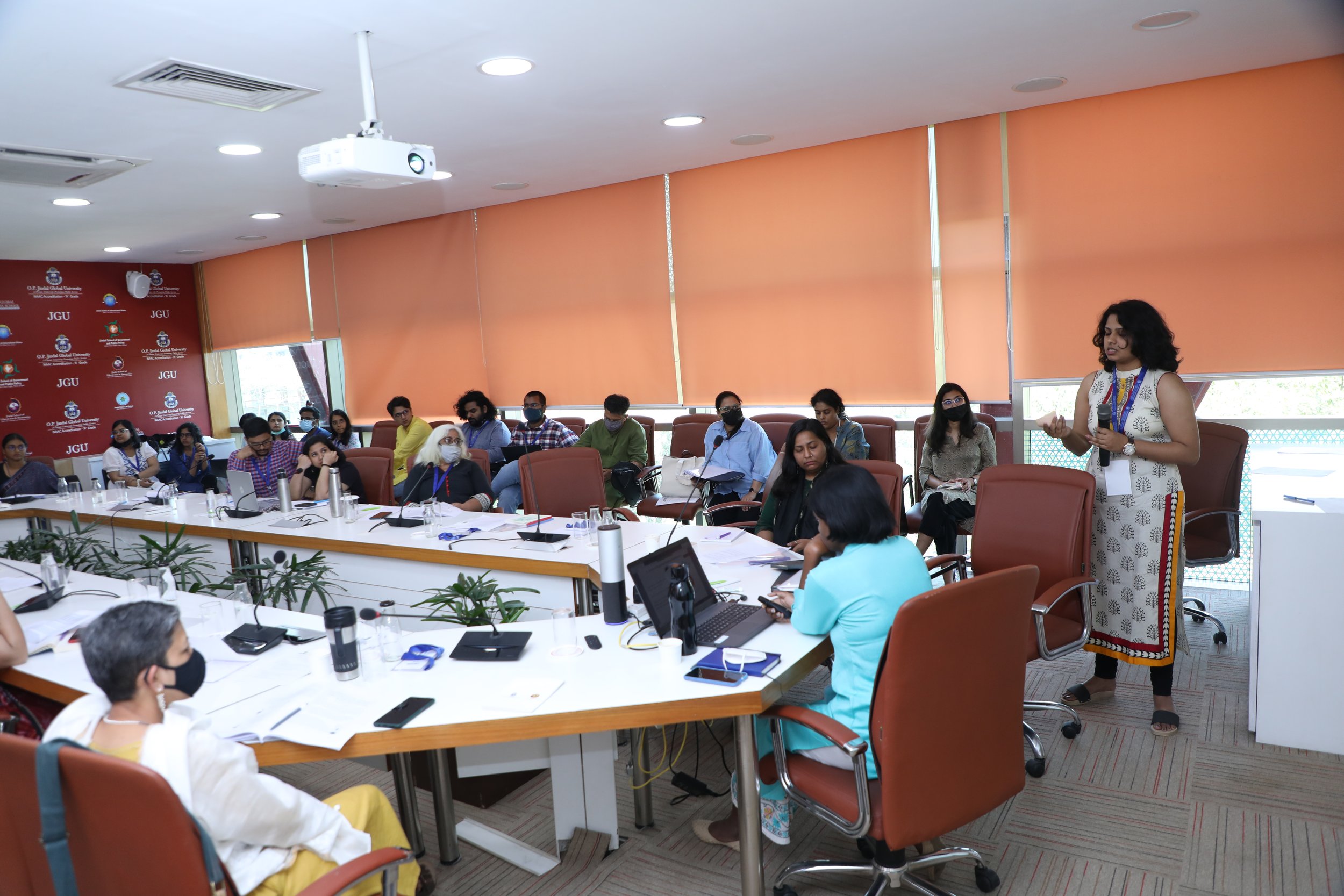
Clinical Legal Education
Clinical legal education promotes social justice by improving access to justice for the underprivileged, by introducing law students to ideas of public service responsibility and by creating an experiential understanding of the relationship between law and social justice.
Through classroom teaching and collaborative field projects, the Clinic seeks to proliferate intersectional anti-oppression discourses for comprehensively addressing marginalisation along the axes of gender, caste, indigeneity, disability, and sexuality.
Clinical courses often culminate in the publication of a resource guide, handbook or other material that will set forth research, increase legal awareness and empowerment, and provide practical and accessible advice for activists and community members.
Community engagement is imperative as it promotes reflection by students on their privileges, as well as their larger role as law students and changemakers. The community, in this regard, is the primary source of the goals of the project, keeping in mind the complexities, debates and disagreements among the members.
-

Trans Justice and the Law Clinic (2023-2024)
For the academic year 2023-24, the Law and Marginalisation Clinic, ILGA Asia, and Transmen Collective offered the Trans Justice and Law Clinic. The Clinic primarily focused on the right to cohabitation for queer persons and worked on a collaborative project with ILGA Asia and Transmen Collective on punitive laws, gender and sexuality. Students also engaged with critical scholarship on anti-discrimination laws, critical clinical legal education, constitutional law, queer politics, gender identity, critical legal theory, intersectionality, critical caste and race theory, anti-carceral politics, empathetic lawyering, drafting skills, research and writing skills.
The Clinic was a year-long commitment for eight credits along with an optional winter clinical programme for two additional credits.
-
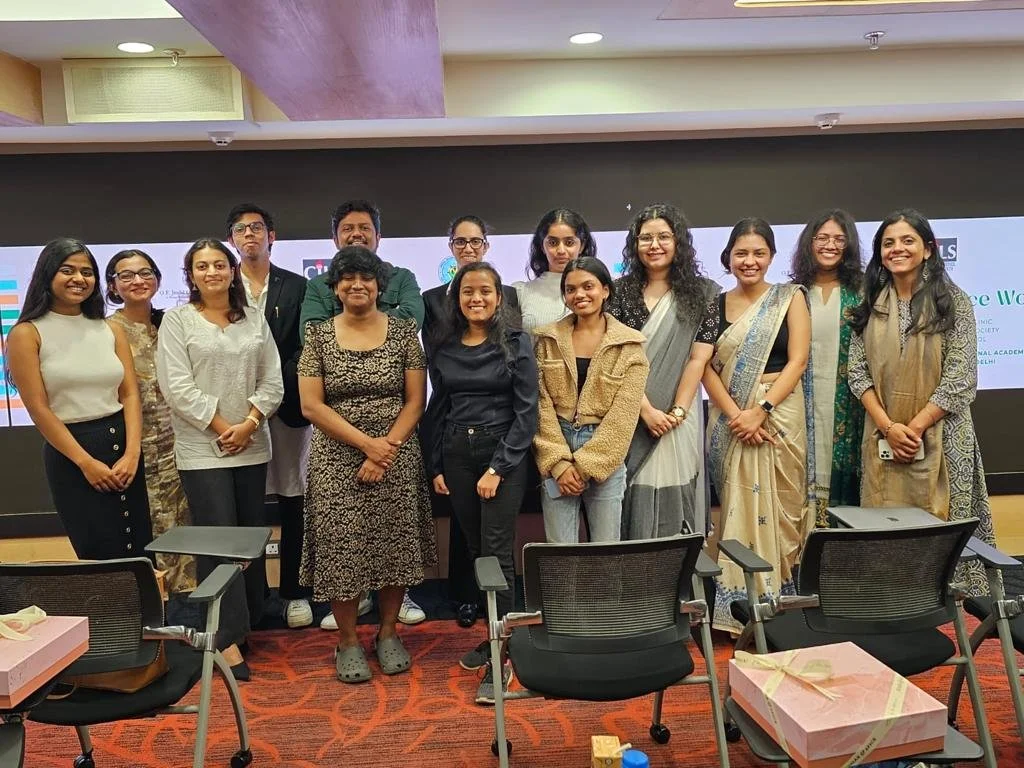
Reproductive Justice and the Law Clinic (2023-2024)
In 2023-24, The Law and Marginalisation Clinic, CJLS, in collaboration with Hidden Pockets Collective and CommonHealth India, offered a clinical course titled Reproductive Justice and Law. The Clinic primarily focused on unpacking the politics of abortion and the contemporary developments in the global landscape of abortion laws, looking closely at the decriminalisation of abortion through Courts. The students also worked on a clinical project, developing a collaborative manual on global abortion jurisprudence within the framework of Constitutional Law and Criminal Law by looking at constitutional cases in 5 countries on Canada, Colombia, Mexico, South Korea and Thailand. Students also engaged with critical scholarship on anti-discrimination laws, critical clinical legal education, Constitutional Law, queer politics, gender identity, critical legal theory, intersectionality, critical caste and race theory, anti-carceral politics, empathetic lawyering, drafting skills, research and writing skills. The Clinic was a one semester commitment for four credits.
Learn more -
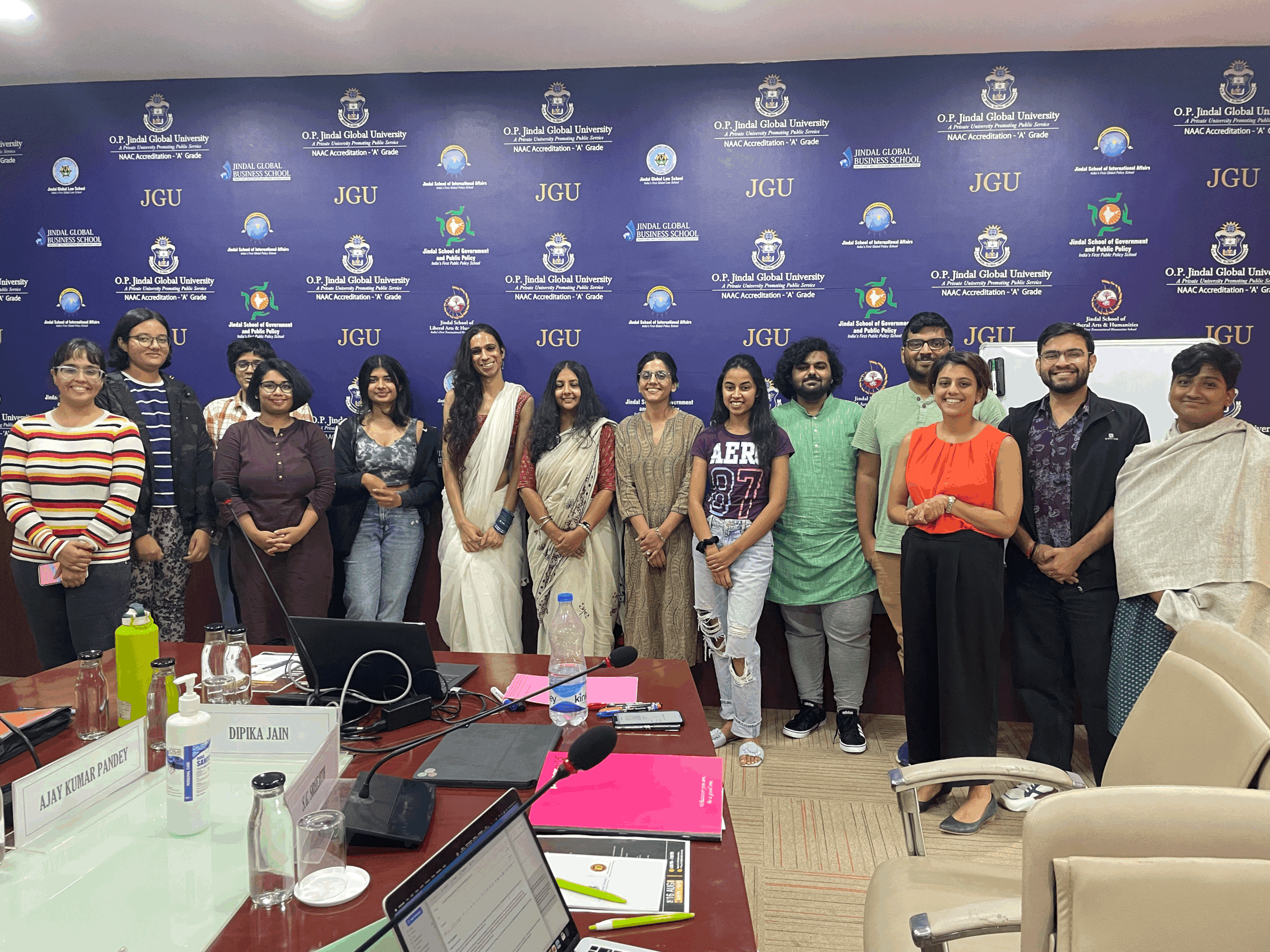
Trans Justice and the Law Clinic (2022-23)
In 2022, the Law and Marginalisation Clinic, CJLS offered the Trans Justice and the Law in collaboration with Transmen Collective and Egale Canada to provide students with an opportunity to engage with the contemporary research and writing on the recognition and rights of transgender and gender variant persons in India and globally.
This clinical course aimed to develop a comprehensive handbook on the laws and policies governing the rights of transgender and gender-variant persons.
Learn More -

Reproductive Justice & the Law Clinic (2021-22)
In 2021, CJLS launched the Reproductive Justice & Law Clinic – a pilot clinical project to bridge the gap between activism and academia and develop a project in consultation with social movements and offered a one year long clinical course on reproductive justice, gender and the law in partnership with CRR and CommonHealth. Students engaged with critical readings on feminist theory, intersectionality, and reproductive justice to have a nuanced understanding of these concepts and developed an advocacy manual on the barriers to accessing abortion services from an intersectional lens, thereby articulating theoretical learnings in a practical manner.
-
Compensation and Relief for Survivors of Violence Clinic (2020-21)
The clinic was offered in collaboration with Karwan-e-Mohabbat and Amritananda Chakravorty and focused on building essential skills for students in response to the Delhi High Court’s orders directing immediate assistance to riot victims in Delhi.
Students were trained by practitioners and CJLS faculty on laws related to compensation and subordinate legislation (such as government schemes on relief funds for victims of violence). Students also acquired first-hand experience of interviewing people in relief camps, completing and filing appropriate documents, and assisting with first information reports.
-

Gender, Law & the Difference Clinic (2017-18 and 2016-17)
In collaboration with Alliance India, Multiple Action Research Group (MARG) and the International Commission of Jurists (ICJ)
Students drafted a Handbook on Rights of Transgender and Gender Non-Conforming Persons in India, which was published in collaboration with Alliance India, Multiple Action Research Group (MARG) and the Inter- national Commission of Jurists (ICJ). The Handbook has been instrumental in creating dialogue and discourse on the status of transgender and gender non-conforming persons in India and has also equipped the community with information to advocate for their legal rights. The students subsequently published a Hindi translation of the Handbook to ensure its accessibility to Hindi-speaking persons and persons working at the grassroots level.
-

Gender and Healthcare in Haryana Clinic (2015-16)
Consistent with the core belief that the impacted community should be centered in all advocacy efforts, students in “Gender and Healthcare in Haryana Clinic” conducted interviews and consultations with ASHA workers, ANMs and healthcare professionals in Haryana and then developed a pamphlet on the rights violations and other issues faced by such healthcare workers.
This material is currently being used to develop a wide-reaching social media campaign to increase awareness on the rights of ASHA workers.
-

Criminal Justice System and the Transgender and Gender Variant People’s Clinic (2014-15)
The Criminal Justice System and the Transgender and Gender Variant People’s Clinic was conducted in collaboration with Mithra Trust and Alliance India.
The clinical course involved the empirical study of queer experiences of violence. The course was bifurcated into two parts: first, students undertook a desk review of prevailing law and policy on transgender rights in India, relevant international law material and comparative research on prison management and transgender rights and second, the clinic worked with grassroots organisations, students and faculty to interview transgender persons in Delhi on how they have been treated by the police and other state officials.
-

Gender Legal Recognition Clinic (2013-14)
Pursuant to discourse on legal gender recognition through guest lectures and writing workshops in the clinical course titled “Gender Legal Recognition Clinic”, students published a resource guide “Recent Legal Reforms on Gender Recognition: A Global Review” through the National Consultation on Human Rights of Transgender People, Hijras and Other Non-Normative Gender Groups in India in November 2013.
This resource guide was a result of collaborative knowledge production among students, faculty, as well as transgender and gender-variant persons. Since its publication, it has been used by lawyers, activists and scholars to further their advocacy efforts for the gender-variant community.
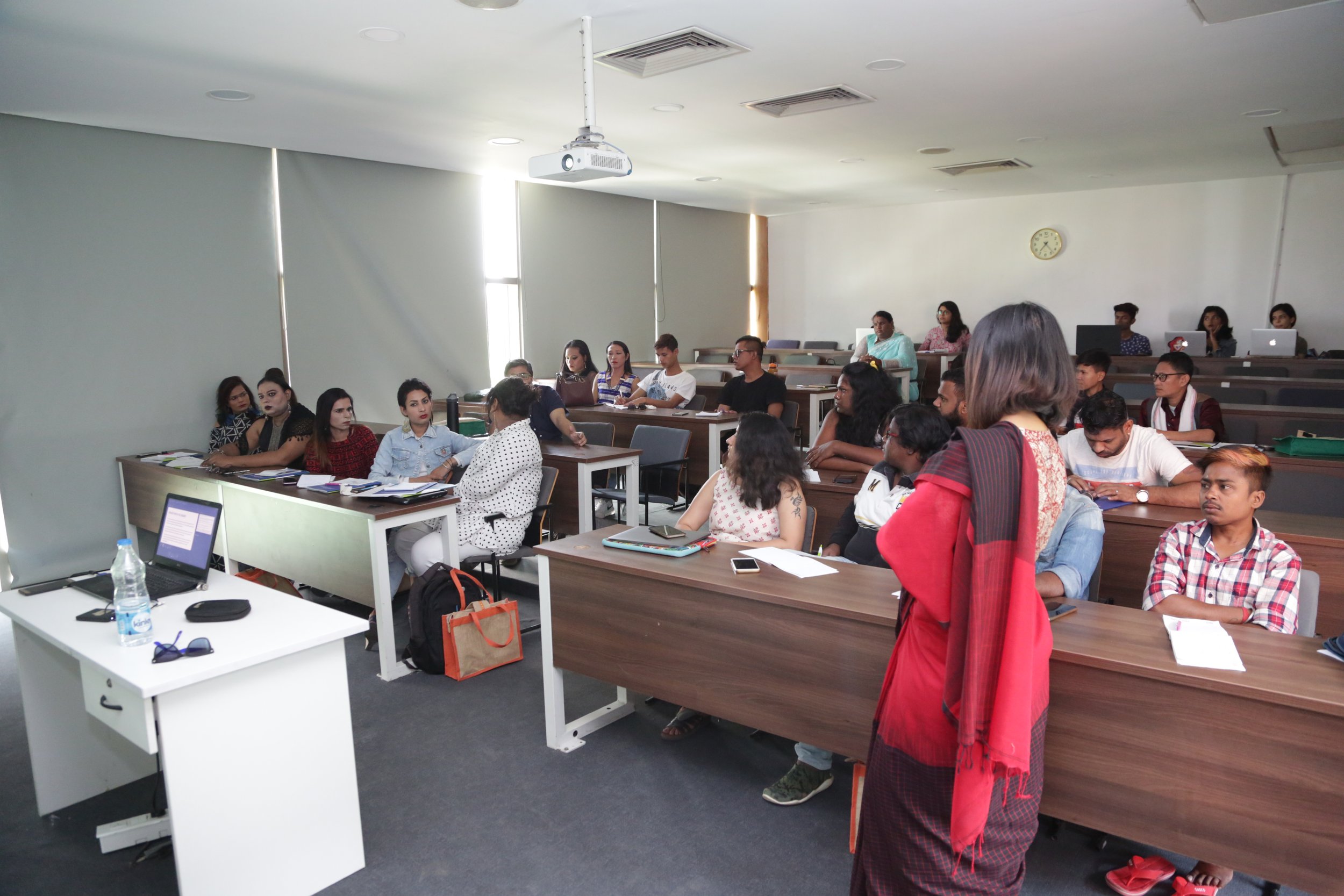
Legal Empowerment
The interventions of the Law and Marginalisation Clinic extend beyond the classroom and seek to develop capacities of community actors through certificate courses and legal empowerment workshops.
-

Public Session on the Transgender (Protection of Rights) Act, 2019 (2023)
The Clinic conducted a public session in Hindi for lawyers from Ahmedabad at the Center for Social Justice. The session focused on the Transgender Persons (Protection of Rights) Act, 2019, and involved discussions on the Act's provisions and rules, as well as how lawyers can utilize legal mechanisms under the law to promote and protect the rights of transgender individuals.
-
Workshop on the Transgender (Protection of Rights) Act, 2019
In October 2023, the Clin corganized an educational session on legal matters for a group of 25 individuals from the transgender community with India HIV/AIDS Alliance. During the session, they explained the provisions of the Transgender Act, 2019, and the Transgender Rules, 2020.. Furthermore, they engaged in discussions regarding hypothetical scenarios, including issues like harassment by police, neighbors and employers, and the issuance of TG Cards, along with legal strategies for addressing these concerns.
-

Workshop: Trans Care Sensitization & Competencies Building for Healthcare (2023)
The Clinic conducted a session on the Transgender Persons (Protection of Rights) Act, 2019, implementation challenges and challenges associated with access to healthcare for transgender and gender-variant persons.
-
Workshop on Rights of Transgender and Gender-Variant Persons in India (2022)
In June 2022, the Clinic conducted a workshop for India Vision Foundation on gender identity, the Supreme Court decision in NALSA, and the rights and entitlements under the Transgender Persons (Protection of Rights) Act, 2019 and the specific guidelines issues for securing the rights of transgender and variant persons within prisons.
-
Certificate Course (2019)
In May 2019, the Clinic conducted the first-of-its-kind fully funded certificate course titled “Human Rights of Transgender, Intersex and Gender-Diverse People” in collaboration with Love Matters India and the ICJ. The certificate course cultivated a space for peer-learning with transgender and gender-variant persons being invited to serve as faculty for the course. The curriculum for the course was also developed collaboratively with transgender activist and scholars and the pedagogical tools adopted by the Clinic sought to develop both a theoretical and practical understanding of the legal framework on the rights of transgender persons in India, especially in view of the Supreme Court’s decision in NALSA v. Union of India. Participants were also given the necessary knowledge and information to navigate public processes like filing of RTIs and First Information Reports.
-

Legal Empowerment Workshops (2017)
In May 2017, the Clinic conducted a two-day literacy workshop for 10 transgender activists as a pilot program in collaboration with Transgender Welfare, Equity and Empowerment Trust (TWEET), Multiple Action Research Group (MARG), India HIV/AIDS Alliance, and the International Commission of Jurists (ICJ). The workshop sought to demystify the law by through legal training and empowerment with specific emphasis on matters related to constitutional law, criminal law, the transgender rights bills, sex work, and access to justice.
A similar workshop was conducted in November 2017.

Legal Aid
In recognition of the law as a tool of empowerment and the barriers to legal representation by marginalised individuals, we provide free and comprehensive legal aid to queer, trans and non-binary persons who have and continue to face significant barriers to the enjoyment of the rights and freedoms secured under the Constitution of India, the Transgender Persons Act, and several other statutes in force in the country.
The Clinic’s legal aid centre was established in 2013 and since then we have received several requests for assistance with targeted legal interventions on key issues including legal name and gender change on identity documents, equal opportunities in education and employment, and fair housing. Our dedicated network of pro-bono lawyers has been a key resource for delivering on these requests.
Contact Professor Dipika Jain and Sneha Mukherjee at lmclinic@jgu.edu.in for legal assistance and queries.
Court Interventions
In addition to on-ground legal interventions and legal counselling, the Clinic also provides pro-bono legal assistance with court interventions. We are currently litigating two cases, one before the Delhi High Court for change of name and gender in educational documents for a transgender woman and the other before the Supreme Court of India for unlawful termination. and discrimination in employment.
We successfully litigated a case before the Delhi High Court in 2023 for a transwoman, who challenged the rejection of a certificate of identity under Section 6 of the Transgender Persons (Protection of Rights) Act, 2019. The District Magistrate refused the certificate on grounds of lack of medical and residential proof.
Legal Counselling and Interventions
The Law and Marginalisation Clinic has legally assisted in 92 cases for trans-justice and reproductive justice. 41 of these cases were for legal counselling of transgender persons who seek legal remedies for rights violations. After counselling, we only legally intervene (through representations, RTIs, visits to government offices, legal notices, court proceedings et al.) on the option of the client. We have legally intervened and counselled clients for issues that range from the issue of transgender identity cards, change of name and gender in official documents, negligence in gender-affirmative surgery, violence and harassment, sex work and discrimination in education and employment.
Legal Aid Desk with India HIV/AIDs Alliance
Alliance India organised the ‘Sahas Holistic Camps for Transgender Persons’ in September and November 2023. These camps aimed at providing holistic health and wellness check-ups and social and financial entitlements for the transgender community.
CJLS provided legal aid at the legal help desk in the camp to assist people with their legal grievances. These grievances included inquiring about the status of their application for their transgender or binary ID cards as well as informing people about their rights and legal protections for issues such as sexual and physical violence, discrimination in education and employment and access to housing and social security schemes. We also provided legal counselling to transgender persons of their rights and entitlements under the NALSA judgment and the Transgender Persons (Protection of Rights) Act 2019, and its 2020 rules.




